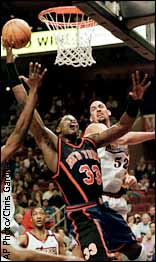| | Patrick Ewing, a Seattle Supersonic ... nope, nope, and might we add,
nope.
|  | | The departure of Patrick Ewing, left, leaves the Knicks vulnerable in the physical Eastern Conference. |
Then again, it wasn't as though he wasn't as sick of being a Knick as
his critics were of him being a Knick. It wasn't as though he hadn't had
enough of New York and the demands incumbent upon its residents. It wasn't as
though he didn't wear the lack of championships as a cloak of sadness, making
him all the less likable in a hard town like La Apple.
That having been said, though, Patrick Ewing isn't really a Seattle
Supersonic, no matter what his uniform says, no matter what the check stubs
read. Having played more than a decade in one place for one team, and having
been the central figure in that place and for that team, makes Patrick Ewing
a Knick forever.
And as such, a quasi-tragic figure.
Ewing went to New York in 1985 as a savior, nothing less. He said a
million times he should not be viewed that way, but he lied, and he knew he
was lying, and he knew that we knew he was lying. He knew the expectations,
and came to understand them as Bill Russell did, and Wilt Chamberlain did,
and Shaquille O'Neal does now. You can't be a army general and claim you're a
Quaker.
So Ewing came to understand the load dropped upon him. He was given his
rope in the first four seasons, when the Knicks went from 23 to 24 to 38 to
52 years, and went from missing the playoffs to reaching the first round and
then the conference semifinals.
But he had to wait his turn through the Isiah Thomas Piston and Michael
Jordan Bull eras, and his best chance to win his city's heart -- 1994 -- was the
year Hakeem Olajuwon outplayed him and the Houston Rockets outplayed his
teammates.
Indeed, by the time the Knicks reached their only other NBA Finals, two
years ago against San Antonio, he had become almost an ancillary figure. He
was like Bill Clinton, in that he had long ago lost the power to change
people's minds about him. Anyone who had an opinion on Patrick Ewing had
already voted long ago.
|
“ |
Indeed, by the time the Knicks reached their only other NBA Finals, two
years ago against San Antonio, he had become almost an ancillary figure. He
was like Bill Clinton, in that he had long ago lost the power to change
people's minds about him. Anyone who had an opinion on Patrick Ewing had
already voted long ago. ” |
Thus, you hear remarkably little of the "Patrick, We Hardly Knew Ye"
blather you find in softer, less ruthlessly cosmopolitan towns. His job was
to be Willis Reed for the next generation, and he wasn't. He paid for that
failing, and for a hundred others either less important or utterly
fabricated.
Ewing, knew only his reality of Patrick Ewing, and took a long time to
understand the concept of Patrick Ewing as espoused by everyone else. Once he
did, though, whatever outward joy could be pried from his game essentially
disappeared. Having failed to shower the people of New York with reflected
glory, he was turned by his detractors into some kind of modern-day Walt
Bellamy, which was wrong, and by his defenders into a quintessential victim
of New York, which was equally incorrect.
Given those two choices, plus the added dynamic of having the team he
regarded as his being eased from his hands and given to Latrell Sprewell and
Allen Houston, he was transformed into a joyless, war-weary soldier who had
seen and known too much he could not adequately describe.
He gimped in and out of the nation's mega-arenas with bad knees, bad
feet, a bad back and all the other wear and tear of too many years on
hardwood floors. He was the used-to-be-go-to guy. He was the former prime
minister, voted out by his constituents but still a part of the government
for his years of faithful service.
And he looked every bit of his 38 years, even as he was being announced
as the latest Seattle Supersonic, the logical inheritor not of Willis Reed's
mantle, but of Jack Sikma's. The image was too jarring, too conflicted with
the Patrick Ewing each of us had constructed for ourselves.
Maybe he'll find the happiness eroded from his game in New York; maybe
he was meant to be a Sonic all along, and we just didn't know it. Some
conspiracy freaks still think he was meant to be a Golden State Warrior and
just ended up in New York because of David Stern's educated lottery
fingers.
Fact is, though, Patrick Ewing will always be a New York Knick, if only
because nobody has the imagination required to think of him any other way.
For good, and ill alike.
Ray Ratto, a columnist for the San Francisco Examiner, is a regular contributor to ESPN.com. | |
ALSO SEE
Sonics get Ewing in four-team, 12-player deal
Aldridge: Sadly, Ewing divorce is official
Denberg: Hawks won't bail Knicks out
Breaking down the Ewing trade
Mourning: Ewing felt disrespected
|

